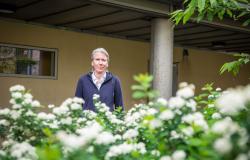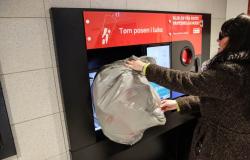A colleague raised his head this week and asked: All these murders and family murders a day, could it be due to the economy?
It is probably not possible to determine what is behind the unusually high number of murders in Norway so far this year. What makes grandfathers kill children and grandchildren, family fathers execute the family?
It is not possible to know why violent crime seems to have exploded around us, almost on all sides. In recent weeks, there have been daily reports of stabbings and shootings in Oslo. The police are concerned that more and more crimes are being committed among younger and younger children. VG reported this week that eight-year-olds push drugs for the gangs.
The seriousness that murmurs like an inflammation
On Wednesday, a principal was attacked by a child at a school in Oslo. On Thursday, there were reports that a boy had been attacked and stabbed on the way to school by a man in his 50s. The schools, the streets, civilians, weekdays. What is happening to the world, exclaimed a voice behind a desk in the open landscape here at work. On Friday, the Labor Party’s Hadia Tajik and Tonje Brenna moved out of VG – they will break the backs of the gangs. Before it becomes Swedish conditions.
In Sweden, a 39-year-old family man was recently shot on the street in Skärholmen outside Stockholm. He is said to have asked a gang to stop dealing drugs. It cost him his life. This week, Sweden was rocked by neo-Nazis attacking a political meeting. The unlucky pensioners guarding the entrance were sprayed in the face and several meeting participants were subjected to serious violence. At the same time, the whole thing was filmed for dissemination on social media, as recruitment bait for young, angry men.
Synnove Vereide Trampe: The men’s committee has spoken. The time is ripe for a change of pace
Yeah, what’s going on? The newspapers give us the first draft of history, but what the narrative of 2024 will be, we will not know for many years. That is why I quote the anecdotal sighs of my anonymous colleagues. Because they express what so many people think during the day. Unrest and insecurity that reaches into our core. And which has persisted since the world shut down in March 2020 in the face of the coronavirus. Since then it has been a mental state of emergency.
It is noticeable in everyone you meet. At lunch. On a sideline in children’s football. At a party. Over a coffee. The seriousness that murmurs like an inflammation just below the still rather calm surface of our society.
Putin’s attack on Ukraine, his threats about the use of nuclear weapons, the West’s reflexes about rearmament and the feeling that something new and unknown is in the offing, have ensured an existential unrest at the level of civilization that, in practice, no modern people have known before. The conflict in the Middle East also threatens to creep in our direction. The war in eastern Europe created expensive times and a dramatic break with ten years of abundance for many. Loss of security, perhaps also loss of face and place in social hierarchies can trigger morbid frustration. Which can end in tragedy.
Kjell Werner: Don’t close the borders during the next pandemic
Norwegian consumer debt has skyrocketed in this period. Debt collection cases are increasing and Nav is now experiencing that many more people are seeking help. “We see the impact of the animal age, where residents over time have lived on credit or consumer loans,” says the head of Nav in Fredrikstad. In the city of Østfold, Nav is now extending its opening hours to help everyone. Failing security, whether from war or economic worries, presses on us. For some it may be too much.
During the corona, we withdrew as a society. We failed the children. Schools closed, sports halls and leisure facilities closed. And we failed the weakest of these. Children in our least well-resourced homes could become easy victims of cynical forces that needed couriers and henchmen in a booming drug market. In our fear we created vacuum, adultless streets. We don’t know, but the pandemic left behind a tougher climate. More crime, younger actors. More cynical fullbacks.
At the same time, the consequences of many political choices are now beginning to be seen. There are now parallel debates about the dropout in sports and the lack of sports facilities, the price of the six-year reform and the marginalized position of boys, about violence in schools. They come on top of megatrends where we just float along more or less benevolently, such as in matters of immigration and migration in the age of globalization, which have inevitably brought with them problems linked to poverty and alienation, and the development of technology – which we only follow and not controlling at all. The last addition is the uncertainty surrounding the effect of artificial intelligence.
The sum of this is April 2024. A whipped atmosphere. A dawning feeling that it is slipping away. And we should know that, there is a strong feeling that foreign forces are more than happy to contribute to society. Some are served by our contradictions and sharper tone. Sorting through all this is not easy, because much is inextricably linked. And much is beyond our control. But we can influence the most fundamental. What we can do is to reduce the possibility that our children, and especially boys, due to a lack of direction and belonging, become victims of right-wing extremists or criminal gangs. We can tighten our grip, we must invest in children and young people. Give eight-year-olds better options than being a running boy for gangs.
Kjell Werner: Our politicians need to step up
In the last couple of years, both Aftenposten and VG have put the spotlight on sports and especially football’s development in Oslo. How the center of gravity has shifted from east to west, how the economy has changed the assumptions in a few years. It reflects a societal development. The areas in the city that need sport the most have the worst training conditions, they lack money and volunteers, and experience the highest drop-out rates. At the same time, it is revealed that politicians have failed for decades when they have had to make demands on developers to ensure that activity for children and young people is a fundamental prerequisite when the city grows. The urban development at Løren and Ensjø in Oslo is in that sense a scandal.
This is how we lost the battle for the youth who needed us the most.
Sigrid Bonde Tusvik: This is what Brenna is trying to tell us: We must break the working pattern!
Read more from political editor Lars West Johnsen
Keep yourself updated. Get a daily newsletter from Dagsavisen
Tags: lost battle youth needed Dagsavisen
-





